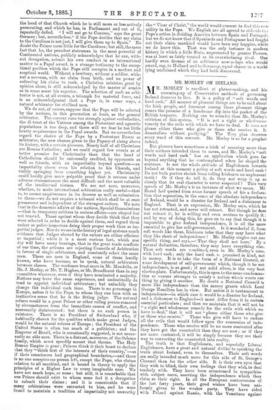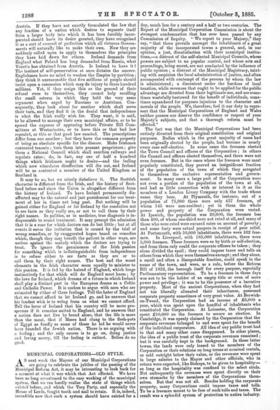MR. MORLEY ON IRELAND.
MR. MORLEY is excellent at phrase-making, and his summing-up of Conservative methods of governing Ireland deserves to live. It is a policy of "soft words and hard cash." All manner of pleasant things are to be said about the Irish people, and foremost among these pleasant things comes the promise of a handsome dip into the pocket of the British taxpayer. Nothing can be sounder than Mr. Morley's criticism of this system. "It is not a right or wholesome remedy for the evils with which we have to deal. It does not please either those who give or those who receive it. It demoralises without pacifying." The Tory plan deserves every word of this censure. Mr. Morley is so far a prophet indeed.
But phrases have sometimes a trick of meaning more than their authors intended them to mean, and Mr. Morley's "soft words and hard cash" has an application which goes far beyond anything that he contemplated when he shaped the sentence. Is not the whole attitude of Englishmen towards Ireland at this moment a policy of soft words and hard cash-? Do not both parties shrink from telling Irishmen an unpleasant truth ? Or if they do tell it, do they not wrap it up so closely that its real character is never suspected ? This very speech of Mr. Morley's is an instance of what we mean. Mr. Brand had quoted from some former speech of his a declara- tion that separation, in the sense of the absolute independene,e of Ireland, would be a disaster for Ireland and a dishonour to England. That is an expression, Mr. Morley says, which he has not retracted, and never will retract. But though he does not retract if, he is willing and even anxious to qualify it ; and by way of doing this, he goes on to say that though it is impossible to give Ireland independence, it is all the more essential to give her self-government. Is it wonderful if, from soft words like these, Irishmen infer that they may have what they like short of independence? Mr. Morley singles out one specific thing, and says,—' That they shall not have.' By a natural deduction, therefore, they may have everything else. Thus soft words are combined, even in Mr. Morley's case, with hard cash ; only the hard cash is promised in kind, not in money. It is to take the form of a National Council, or some development of self-government which, though it be not independence, is as good; if not solid silver, is the very best electro-plate. Unfortunately, this is open to the same condemna- tion as coarser attempts to satisfy a nation which wants one thing by giving it another. No doubt a National Council is more like independence than the money grants which Lord George Hamilton has in view. But unless it is tantamount to independence—in which case it would be a disaster for Ireland, and a dishonour to England—it must differ from it in certain essential particulars ; and then we maintain that it will not be "a right and wholesome remedy for the evils with which we have to deal," that it will not "please either those who give or those who receive." Those who give will have to endure all the evils that would follow upon the concession of inde- pendence. Those who receive will be no more contented after they have got the counterfeit than they are now ; or if they are more contented, it will be simply because they see their way to converting the counterfeit into reality.
The truth is that Englishmen, and especially Liberal Englishmen, have a great and natural dislike to -speaking the truth about Ireland, even to themselves. Their soft words are really intended much more for this side of St. George's Channel than for the other side. It is their own eyes that- they wish to blind, their own feelings that they wish to deal tenderly with. They have been accustomed to sympathise with subject races, asserting the independence which they claim as their right. In all the European controversies -of the last forty years, their good wishes have been uni- formly given to tie weaker party. They have sided with Poland against Russia, with the Venetians against
Austria. If they have not exactly formulated the law that any fraction of a nation which desires to separate itself from a larger body into which it has been forcibly incor- porated should have its desire granted, they have recognised it as a sort of counsel of perfection which all virtuous Govern- ments will naturally like to make their own. Now they are suddenly called upon to apply to themselves the principles they have laid down for others. Ireland demands from England what Poland has long demanded from Russia, what Venetia has obtained from Austria. Is Ireland to have it ! The instinot of self-preservation at once dictates the answer.
Englishmen have no mind to weaken the Empire by partition ; they think it unreasonable that five millions of people should insist upon a concession which may do injury to three hundred millions. Yet, if they assign this as the ground of their refusal even to themselves, they cannot help recalling the small esteem in which they held the very same
argument when urged by Russians or Austrians. Con- sequently, they look about for another which shall serve their turn, and they find it in the denial that independence is what the Irish really wish for. They want, it is said, to be allowed to manage their own municipal affairs, or to be spared the expense of appearing before Private Bill Com- mittees at Westminster, or to have this or that bad law repealed, or this or that good law enacted. The prescriptions differ from one another ; but they have the common property of being an absolute specific for the disease. Make Irishmen contented tenants ; turn them into peasant proprietors ; give them a National Council which shall sanction railways and regulate rates ; do, in fact, any one of half a hundred things which Irishmen ought to desire—and the feeling which now stimulates disaffection will die out, and Ireland will be as contented a member of the United Kingdom as Scotland is.
It may be so, but we utterly disbelieve it. The Scottish character is different from the Irish, and the history of Scot- land before and since the Union is altogether different from the history of Ireland. To have Ireland permanently dis- affected may be the natural and just punishment for our treat- ment of her in times not long past. Bat nothing will be gained either for England or for Ireland by the resolution not to see facts as they really are, or not to call them by their right names. In politics, as in medicine, trae diagnosis is in- dispensable to sound treatment. It may prompt the admission that it is a case for which doctors can do but little ; but at all events it saves the irritation that is caused by the trial of wrong remedies, or by exaggerated hopes based on remedies which, though they may benefit the patient in other ways, are useless against the malady which the doctors are trying to treat. To ignore the genuineness of the Irish passion for something which is indistinguishable from independence is to refuse either to see facts as they are or to call them by their right names. The best and the worst elements in the Irish character seem equally to minister to this passion. It is fed by the hatred of England, which longs instinctively for that which will do England most harm ; by the love for Ireland, which dreams of a future in which Ireland shall play a distinct part in the European drama as a Celtic and Catholic Power. It is useless to argue with men who are animated by either of these feelings. Tell the hater of England that we cannot afford to let Ireland go, and he answers that his fondest wish is to wring from us what we cannot afford. Tell the lover of Ireland that his country will be more pro- sperous if it remains united to England, and he answers that a nation does not live by bread alone, that the life is more than the meat, that if Moses had clung to the flesh-pots of Egypt as fondly as some of those he led he would never have founded the Jewish nation. There is no arguing with a feeling ; and the only course is to go on, doing justice and loving mercy, till the feeling is extinct. Bribes do no good.















































 Previous page
Previous page